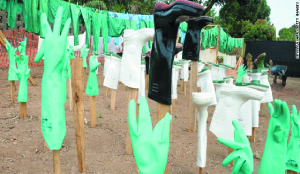By SYLVESTER MWALE –
WITH a confirmation of Ebola outbreak in the neighbouring Democratic Republic of Congo (DRC), nearly all Zambians will have to raise alertness and pray that the virus does not cross the border.
This is a deadly pandemic which can kill up to 90 per cent of those who contract it. In fact, it is estimated that 1,427 people have died from the virus out of 2,615 cases since March when Ebola broke out in West Africa.
The Ebola outbreak in West Africa is the world’s deadliest to date and the World Health Organisation has declared an international health emergency.
Efforts are being scaled up around the world to prevent the spread of the virus with countries such as South Africa, Ivory Coast, Gabon, Senegal and Cameroun banning travellers from the affected countries.
In Zambia, screening on entry points has been heightened although there are still concerns in some quarters of society that the country’s borders are porous and people are crossing without being checked.
Besides, there is fear that Zambia has inadequate capacity to contain the deadly pandemic in case of any breakout. In this regard, the best solution is prevention although that can only be achieved if people are aware about how one can contract or avoid the virus.
In the wake of the Ebola breakout in Congo DR, the Sunday Times talked to ordinary people to find out what they knew about the disease and whether they were able to avoid it.
Maureen Chanda, a trader at Soweto Market in Lusaka said she had heard about the disease although she was not sure how one could catch it.
“What I know is that Ebola is an African disease and that many people have died from it,” Ms Chanda said. “I am told it is worse than cholera because it is difficult to contain.”
She, however, admitted that she did not know how one could know that a person had contracted the virus.
Edgar Phiri, a sales man in Lusaka said Ebola was a deadly pandemic that should be given no chance to cross into Zambia.
“I have watched devastating pictures on television and I think the Government is taking chances by not banning citizens from affected countries.
“From what I have heard, it will be very difficult for us as a country to contain Ebola if it comes to Zambia because we already have a shortage of health workers,” Mr Phiri said.
Ebola is a viral illness of which the initial symptoms can include sudden fever, intense weakness, muscle pain and sore throats, according to the WHO.
Subsequent stages would include vomiting, diarrhoea and – in some cases – both internal and external bleeding.
However, some people feel that little has been done to ensure that information on such signs is on the finger tips of every Zambian.
“I am not sure how one can know that a person has Ebola,” said Ethel Banda of Chipata. “I think this is the information that should be placed in markets and bus stations in order to educate the masses.”
Ms Banda said that while there had been wide coverage of Ebola, the Government could do more by printing fliers and other documents and distribute them to citizens, now that the disease had been declared an international health emergency.
Sylvia Singoyi of Livingstone said the campaign of educating the people about the dangers of Ebola should be intensified by placing massages in public places.
Ms Singoyi noted that although there had been sustained international reports about Ebola from affected countries, many Zambians were still not aware of how to prevent or detect the virus.
“This is Africa where our culture and tradition can be a catalyst of this disease unless there is proper education to sensitise the people on how to prevent it,” Ms Singoyi said.
“Now that it is in (DR) Congo, the chances are getting high that we will have it here as well because we have people who are crossing every day without being screened.”
Social media reports indicate that despite assurances that every person crossing into Zambia is subjected to heavy screening, there are some people who are entering the country without being checked.
“Despite the Ebola threat in neighbouring DR Congo, it is business as usual at Kasumbalesa border post as people are crossing into Zambia without being screened,” said one of the residents in Kasumbalesa.
“That’s so sad, and with the poor medical standards in our country, people will die like flies when it catches up in Zambia, we need to pray for God’s mercy.”
It is clear that much as there have been efforts to prevent the contraction of the Ebola virus into Zambia, more still needs to be done to quash any potential spread.
 The people will only be able to avoid contracting it once they have information at their finger tips.
The people will only be able to avoid contracting it once they have information at their finger tips.
Please NOTE that:
• Ebola infects humans through close contact with infected animals, including chimpanzees, fruit bats and forest antelope.
• It spreads between humans by direct contact with infected blood, bodily fluids or organs, or indirectly through contact with contaminated environments.
• As a precaution, avoid contact with Ebola patients and their bodily fluids. Do not touch anything – such as shared towels – which could have become contaminated in a public place.
• Washing hands and improving hygiene is one of the best ways to fight the virus.
• Symptoms include high fever, bleeding and central nervous system damage.
• Fatality rate can reach 90 per cent – but the current outbreak has mortality rate of about 55 per cent Incubation period is two to 21 days
• There is no vaccine or cure
• Supportive care such as rehydrating patients who have diarrhoea and vomiting can help recovery.







